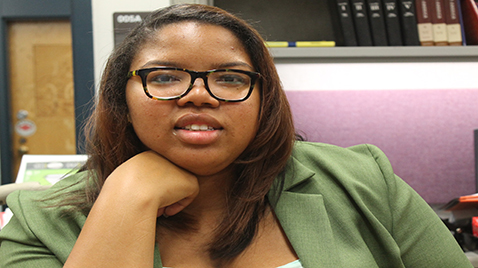BALTIMORE – When Brittany Walker was accepted into the Upward Bound program at the University of Maryland Baltimore County in 2004, she did not expect to stay for 10 years.
Walker now works as a full-time academic counselor with the program, which aims to provide support for high school students from low-income families, and prepare them for college. Upward Bound’s goal is to equip students with skills in leadership and communication, as well as academic instruction.
As Upward Bound celebrates its 50th anniversary this year, educators at schools like UMBC are introducing new ideas to serve the changing needs of low-income students. For example, since 2007, the UMBC program has trained students like Walker to serve as mentors for younger peers.

“I thought it would be a great opportunity for me to become a leader and see how it goes,” Walker said. “So when I got in the real world, I could be a great leader.”
Walker was a senior in high school at the time, and among the first students to train as a peer leader.
Walker said older students would rarely socialize with underclassmen. For her, the peer leadership program was a way “to bring everyone together as one.”
It also gave her valuable leadership experience.
Known as peer group connection, the goal is to provide younger students with a mentor close to their age, while teaching older students leadership skills.
“It gave students an opportunity to speak out,” Walker said, “and be themselves without fear of being judged.”
Upward Bound serves 826 students in Maryland, according to the U.S. Department of Education. UMBC’s program includes roughly 140 students, drawing from schools in eastern Baltimore and Baltimore County.
The program, which is federally funded and serves almost 60,000 students nationwide, is required to provide academic instruction in areas like math, science and foreign languages. Students also receive career and academic counseling.
Peer group connection is a relatively new addition to Upward Bound, which was signed into law in 1964 by President Lyndon B. Johnson.
Corris Davis, director of UMBC’s program, has worked with Upward Bound since 1995. She said that after seeing how students and their environment have changed during her tenure, she recognized that the program must evolve.
“When I see a ninth-grader now compared to a ninth-grader 15 years ago, they’ve seen so much more of the world,” Davis said.
This, according to Davis, is one of the biggest issues that counselors and program coordinators face in order to engage with students.
“Some things are difficult because we’re trying to fit into the same models we’ve always had with students who are facing different challenges,” Davis said.
Davis led a panel on her program’s experience with peer leadership at the Council for Opportunity in Education’s annual conference in Washington this week.
The conference gathered educators nationwide for presentations on Upward Bound and other federal programs aimed at helping low-income students, known as TRIO services.
Sen. Dick Durbin, D-Ill., spoke at the conference, emphasizing that expanding opportunities for education is an important way to bolster the economy.
“You know who I think about when I think about job creators?” Durbin said. “Teachers.”
Davis’ panel at the conference also featured Christine Harris and Dr. Margo Ross, both officials from the Center for Supportive Schools. The organization developed the peer group connection curriculum being used at UMBC.
Harris is an alumna of Upward Bound, and served as an academic tutor for the program. Before peer leadership was introduced, Harris felt the older and younger students were drifting apart.
She believes the initiative has changed the atmosphere of the program as a whole.
“Now that (peer leadership) is part of what Upward Bound does, there has been a cultural shift,” Harris said.
Still, Davis believes her program could be more effective if students were enrolled at a younger age. Upward Bound is currently limited to students who have completed eighth grade.
Davis said today’s 14-year-olds are growing up faster than 14-year-olds in 1964.
“When we’re starting in ninth grade, we don’t have time to give them the skills and resiliency they need to succeed in college,” Davis said.
Maureen Hoyler, president of the Council for Opportunity in Education, also believes that Upward Bound must evolve in order to remain effective.
“We continually need to innovate. There’s no one answer,” Hoyler said. “We can’t keep doing what we were doing 50 years ago.”
Whether or not Upward Bound faces more changes in the future, Walker enjoyed her experience with the program. She completed a sociology degree in 2012, and is now working on her master’s at the University of Maryland, Baltimore.
“I’ve been part of this program since 2004 and never left,” Walker said. “It’s been a great fit.”


You must be logged in to post a comment.